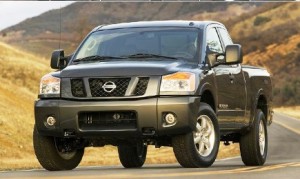Key work remains to be completed on Nissan’s new full-size pickup truck, Larry Dominque, head of product planning for Nissan operations in the Americas, said this week, but it is a work in progress with a high priority at Nissan design center in San Diego. While powertrain and other engineering issues have yet to be resolved, the interior and exterior design work is now locked into place.
The new model will replace the sluggish-selling Titan, which Dominque acknowledged has never quite lived up to Nissan’s expectations. But it still fills an important role for the Japanese maker, which continues to position itself as a full-range vehicle provider.
“Our dealers love the truck,” said Dominque, who also confirmed the next generation Titan will be a “body-on-frame” vehicle, even though some had speculated the maker would go to a crossover-style unibody design, similar to Honda’s approach with the smaller Ridgeline.
Much of the basic engineering for the truck will be handled at the Nissan Technical Center, outside Detroit, where the staff has extensive experience working on body-on-frame vehicles – including the NV commercial vehicle Nissan will launch this spring.
Nissan is also looking at ways to combine its two compact truck platforms, including the one used for the Frontier, into a single architecture it can use on a broad range of products in the future. That study, however, is still incomplete.
The updated Titan project is a bit behind schedule due to a major shift in strategy.
Nearly three years ago, Nissan announced that it was prepared to sign an agreement for a Titan that would be developed jointly with Chrysler, the domestic automaker responsible for engineering and production.
The final agreement never materialized, in part, because it was sidelined by the collapse of Lehman Brothers, which triggered a financial meltdown that ultimately plunged the Detroit automaker into bankruptcy.
But, in hindsight, it was clear Chrysler’s corporate heart was never really into the joint venture.
A key Chrysler product planning executive noted recently that the management of the company, then owned by Cerberus, a New York investment firm, was under orders to look for deals with other automakers as a way to off-load product development costs.
Chrysler approached a host of erstwhile competitors, ranging from Chinese automakers, such as Geely, to more established manufacturers, such as Nissan and Volkswagen and even General Motors, which was, at the time, sinking into its own financial crisis. The only significant deal to materialize was with VW.
Sergio Marchionne, now the CEO of the Chrysler/Fiat alliance, said Chrysler will continue to build minivans for Volkswagen for as long as the German maker wants them.
As for pickups, it appears Chrysler is now quite willing to go it alone in developing a future version of its Ram models, despite the hefty engineering costs associated with tightening federal fuel economy standards.

